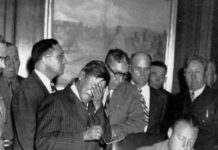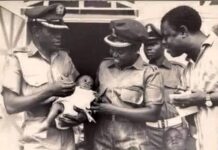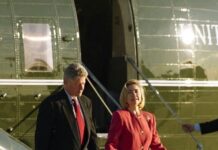“Good morning fellow Nigerians, this is Lt. Col. B. S. Dimka of the Nigerian Army calling. I bring you good tidings. Murtala Muhammed’s deficiency has been detected. His government is now overthrown by the young revolutionaries. All the 19 military governors have no powers over the states they now govern. The states’ affairs will be run by military brigade commanders until further notice.
“All commissioners are sacked, except for the armed forces and police commissioners who will be redeployed. All senior military officers should remain calm in their respective spots. No divisional commanders will issue orders or instructions until further notice.
“Any attempt to foil these plans from any quarter will be met with death. You are warned, it is all over the 19 states. Any act of looting or raids will be death. Everyone should be calm.
“Please stay by your radio for further announcements. All borders, air and sea ports are closed until further notice. Curfew is imposed from 6:00am to 6:00pm. Thank you. We are all together.”
These words ushered in what has become a sad moment in Nigeria’s chequered history. On February 13, 1976, life was snuffed out of the country’s Head of State, General Murtala Ramat Muhammed, in an aborted coup.
Murtala, 37, was killed alongside his Aide-De-Camp (ADC), Lieutenant Akintunde Akinsehinwa, in his black Mercedes Benz saloon car, when his car was ambushed while en route his office at Dodan Barracks, Lagos. The only visible sign of protection was a pistol carried by his orderly, therefore, making his assassination an easy task.

Since then, every February 13 has brought mixed feelings to forward-looking and progress-minded Nigerians. This is evidenced almost across the federation. There is no state where Murtala is not remembered — talk of roads, airport, library, name it.
Not many young ones know that the Mercedes Benz 230.6, which he was riding before he was killed is one of the artefacts at the National Museum, Lagos.
But what cannot be taken away from the minds of adults around then was Murtala’s dream of Nigeria. His hope and vision of a strong, united nation.
They still have the memory of a leader who believed that Nigeria has to progress and develop like any other country in the world without external influence and without being telemarked or exploited. A leader who felt that Nigeria had what it took — the resources — to survive and stand on its own.
Today, when you mention his name, some will burst into tears and many pray for the repose of his soul. It was not because of how much wealth he was able to acquire before he died. In fact, when he died, he never had more than #13,000 in his account, his son, Alhaji Abba Risqua Murtala Ramat Muhammed, had told The Guardian in 2016. And he had a house someone built for him without his knowledge and which he never saw when he was alive.
Whenever he visited Kano, he always stayed in a hotel, then one of his friends gave him a land and another friend converted the piece of land into boys’ quarters, but he never saw the house. Apart from that, he did not have any property in Kano or anywhere in Nigeria or abroad.
Born Murtala Rufai Muhammed — he changed his name from Rufai to Ramat, when he became Head of State — in Kano, on November 8, 1938, and attended Barewa College, Zaria, where he was a classmate with Muhammed Shuwa.

Muhammed joined the Nigerian Army in 1958 and was enrolled at the Regular Officers Special Training School in Teshie, Ghana, where one of his instructors in military tactics and military law was Chukwuemeka Ojukwu, then a Nigerian officer on secondment to the Officer Training School.
Muhammed received his officer training at Royal Military Academy, Sandhurst, UK, as a regular combatant and underwent subsequent courses in Signals. He was commissioned as a Second Lieutenant in 1961 and was posted to Congo where he served with the United Nations Peacekeeping Force.
Upon his return from the Congo in 1962, he was appointed Aide-de-camp to the administrator of the Western Region, Dr. Moses Majekodunmi.
Muhammed opposed the regime of Johnson Aguiyi-Ironsi, which took power after a coup d’état on January 15, 1966. Aguiyi-Ironsi, as GOC of the Nigerian Army, brought normality back to the nation by imprisoning the coup makers and intimidating the federal cabinet into handing over the helms of government to him.
However, many northerners saw this and the reluctance of Ironsi to prosecute the coup leaders, and the fact that the army was purportedly giving exceptional privileges to the coupist as an indication of Ironsi’s support for the killings.
Consequently, northern politicians and civil servants mounted pressure upon northern officers such as Muhammed to avenge the coup. In the night of July 29, 1966, northern soldiers at Abeokuta barracks mutinied, thus precipitating a counter-coup, which may very well have been in the planning stages.
The counter-coup led to the installation of Lieutenant-Colonel Yakubu Gowon as Supreme Commander of the Nigerian Armed Forces, despite the intransigence of Muhammed who wanted the role of Supreme Commander for himself. However, as Gowon was militarily his senior, and finding a lack of support from the British and American advisors, he caved in. Gowon rewarded him by confirming his ranking (he had been an acting Lt. Colonel till then) and his appointment (Inspector of Signals).
During the Nigerian Civil War, Muhammed was General Officer Commanding (GOC) of the Nigerian Army’s Second Division. This division was responsible for the legendary beating back of the Biafran Army from the Midwestern region, as well as crossing the River Niger and linking up with the First Division, which was marching down from Nsukka and Enugu. Murtala’s encounter with disaster during the war happened shortly after, as he attempted to cross the River Niger to Biafra.
Despite the recommendation of his superiors at Army Headquarters in Lagos that he wait for the bridge, which had been blown up by the retreating Biafra forces, to be rebuilt, he insisted on a riverine crossing. Twice he was beaten back, but he steadfastly kept resolve and finally made it through on his third attempt.
Shortly after this, Murtala, fed up with reprimands from Army headquarters, decided to quit his command and left for an extended holiday in the United Kingdom, but not before threatening to resign his commission. His historic military feats during the war won him national acclaim and respect even from his adversaries.
On July 30, 1975, Brigadier (later General) Muhammed was made head of state, when General Gowon was overthrown while at an Organisation of African Unity (OAU) summit in Kampala, Uganda.
Brigadiers Obasanjo (later Lt. General) and Danjuma (later Lt. General) were appointed as Chief of Staff, Supreme Headquarters and Chief of Army Staff, respectively.
In a short time, his policies won him broad popular support, and his decisiveness elevated him to the status of a folk hero. He waged war against corruption and indiscipline and introduced the phrase ‘with immediate effect’ to the national lexicon.
Over 10,000 public officials and employees were dismissed without benefits, on account of age, health, incompetence or malpractice. The purge affected the civil service, judiciary, police and armed forces, diplomatic service, public corporations, and universities. Some officials were brought to trial on charges of corruption. He also began the demobilisation of 100,000 troops from the swollen ranks of the armed forces.
One of his first acts was to scrap the 1973 census, which weighted in favour of the north, and to revert to the 1963 count, for official purposes. Murtala also retired top federal and state officials to break links with the Gowon regime and to restore public confidence in the Federal Government.
Twelve of the 25 ministerial posts on the new Federal Executive Council went to civilians, but the cabinet was secondary to the executive Supreme Military Council. Murtala imposed the authority of the Federal Government in areas formerly reserved for the states, restricting the latitude exercised by state governments and their governors in determining and executing policy.
Newly appointed military governors of the states were not given seats on the Supreme Military Council, but instead were expected to administer federal policies handed down by Murtala through the military council. He equally initiated a comprehensive review of the Third National Development Plan.
Singling out inflation as the greatest danger to the economy, he was determined to reduce the money supply that had been swollen by government expenditures on public works. Murtala also announced that his government would encourage the rapid expansion of the private sector into areas dominated by public corporations.
He reappraised foreign policy, stressing a ‘Nigeria first’ orientation in line with OPEC price guidelines that was to the disadvantage of other African countries. Nigeria became “neutral” rather than “nonaligned” in international affairs. The shift in orientation became apparent with respect to Angola.
Nigeria had worked with the OAU to bring about a negotiated reconciliation of the warring factions in the former Portuguese colony, but late in 1975, Murtala announced Nigeria’s support for the Soviet-backed Popular Movement for the Liberation of Angola, citing South Africa’s armed intervention on the side of the rival National Union for the Total Independence of Angola (UNITA).
Today, his portrait adorns the country’s 20 Naira note and Murtala Mohammed International Airport in Lagos, Ramat Specialist Hospital in Umuahia, Ramat Polytechnic and Ramat Square in Maiduguri and Ramat Park, Benin, are some named in his honour.
May Allah continue to grant his soul eternal rest in Aljanat Fridaous bijahi Rasulallah ﷺ
Follow the Neptune Prime channel on WhatsApp:
Do you have breaking news, interview request, opinion, suggestion, or want your event covered? Email us at neptuneprime2233@gmail.com





